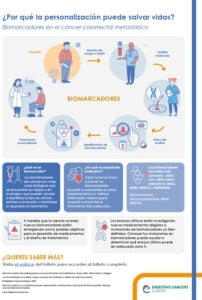BIOMARKERS IN METASTATIC COLORECTAL CANCER (mCRC)
Metastatic Colorectal Cancer (mCRC) occurs when cancer cells from the colon or rectum spread to other parts of the body, such as the liver, lungs, or lymph nodes. Traditional treatments like surgery, chemotherapy, and radiation therapy have been essential in managing this disease.
In recent years, significant progress has been made in the treatment landscape, with an emphasis on personalized therapies. The emergence of biomarker analysis has brought about a more precise and targeted approach to treatment.
Biomarkers are specific molecules, genes, or characteristics within a patient’s tumour that provide valuable information about the cancer’s behaviour and susceptibility to treatment. Various diagnostic tests, such as genetic sequencing and molecular profiling, identify these biomarkers. To learn more about biomarkers for mCRC, browse our publications below.
Biomarker analysis has transformed the treatment landscape by allowing for personalized approaches. Instead of employing a one-size-fits-all strategy, oncologists can tailor treatments based on the specific biomarkers found in a patient’s tumour. This precision medicine approach offers several advantages:
- Improved Treatment Efficacy: By targeting the cancer’s specific vulnerabilities, personalized treatments are often more effective in controlling the disease.
- Reduced Side Effects: Personalized therapies are less likely to harm healthy cells, minimizing side effects and improving the patient’s quality of life.
- Better Survival Rates: Tailored treatments can lead to longer survival and even remission in some cases.
The Crucial Role of BRAF Mutation Analysis
A biomarker that still imposes big challenges in the treatment and management of mCRC is BRAF.
BRAF mutations are alterations in the BRAF gene, crucial in regulating cell growth and division. In the context of mCRC, BRAF mutations have garnered significant attention due to their unique implications for treatment.
Patients with mCRC who harbour a BRAF mutation often face a more aggressive disease course and a poorer prognosis than those without the mutation. This underscores the importance of identifying BRAF mutations early to tailor treatment plans accordingly.
BRAF mutations can render some conventional chemotherapy treatments less effective. Therefore, understanding the presence of a BRAF mutation can guide oncologists away from therapies that may prove ineffective, sparing patients from unnecessary side effects.
The emergence of targeted therapies designed specifically for BRAF-mutated mCRC has brought new hope. Medications like encorafenib and cetuximab have demonstrated promising results in clinical trials, offering more effective treatment options for patients with this mutation.
Combining targeted therapies with immunotherapy or other treatment modalities has shown the potential to overcome the challenges BRAF mutations pose. This approach aims to disrupt multiple pathways driving cancer growth.
Ongoing research efforts and clinical trials continuously explore innovative treatment strategies for mCRC with BRAF mutations, striving to improve outcomes for patients facing this challenging diagnosis.
This year, we inspire hope on mCRC characterized by BRAF mutation, sharing the story of two patients who bravely search for solutions to overcome the challenges posed by their tumour characteristics.
Helen Canning is a young patient from the U.K. who created the Facebook group Breaking BRAF to support patients and families affected by this mutation. Read the story of Helen here.
Guillaume Gourdin is a young patient from France and, together with his wife Laure Chotel and their oncologist Christelle de la Fouchardiere published an article on their personal experiences facing cancer, including their fears, expectations, and attitudes as the disease progresses. The oncologist explains the treatment approach for individuals with BRAFV600E mCRC, highlighting the importance of a balanced management strategy to minimize potential side effects. The article shed light on the enhanced diagnostic methods and the accessibility of a wide range of treatment choices, encompassing different chemotherapy regimens and molecular-targeted medications, to facilitate the swift implementation of treatment plans. Finally, it underscores the significant contributions of patient associations in offering comprehensive support to patients and their loved ones and facilitating connections with healthcare professionals. Read the full article here.
It is crucial to recognize the pivotal role that biomarkers play in the diagnosis and treatment of this challenging disease. The analysis of these biomarkers allows oncologists to make informed decisions about treatment options, increasing the chances of success and offering hope to those battling mCRC. As research continues, the future looks promising, with the potential for even more targeted and effective therapies on the horizon.





















